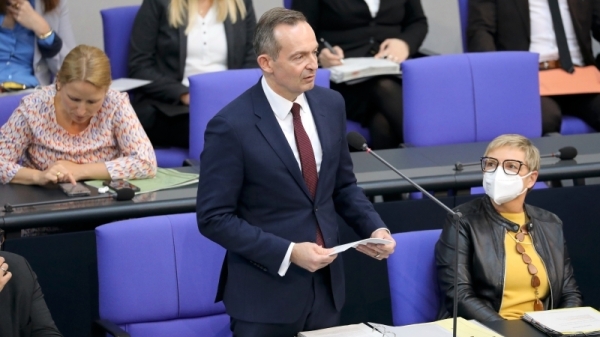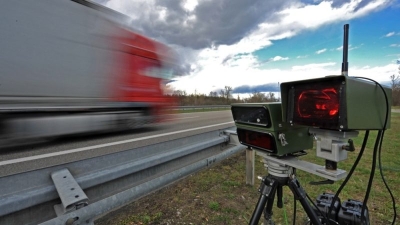Will efforts to ban the combustion engine fall at the final hurdle?

With the news that Germany may abstain from a vote on ending the production of new petrol and diesel cars by 2035, the fate of the long-negotiated law on CO2 standards for cars and vans is now uncertain.
What once seemed inevitable – a European Parliament and Council agreement in October 2022 to end the production of petrol and diesel cars – is now teetering on the edge of collapse.
The final step of the legislative process is a formal vote from member states to finalise the deal, provisionally scheduled for 7 March.
This vote is usually considered a formality, as at this stage, countries have already made their intentions clear during internal Council votes attended by national ambassadors to the EU.
A prior meeting of these ambassadors saw one country vote against it and one country abstain. However, unanimity is not required for the law to pass, as the Council operates under a “qualified majority” system.
A qualified majority requires 55 per cent of the EU countries representing 65 per cent of the EU population. A blocking minority must include at least four member states.
But despite indications that the Council would accept the law, outrage following the European Parliament’s ratification of the law on CO2 emissions standards for cars and vans in February 2023 saw some member states change their position.
Italy announced it would say no to the law at the formal vote, worried that the legislation would hurt manufacturers and consumers.
German Transport Minister Volker Wissing also announced that the bloc’s largest nation will abstain unless the European Commission proposes allowing e-fuels to be used in new combustion engine vehicles beyond 2035.
The fear now is that with Germany abstaining, Italy voting against, and Poland and Bulgaria refusing to back the law, the population level required for a qualified majority will not be reached – meaning the law would not be passed.
Asked by EURACTIV earlier this week, a Polish diplomatic source could not say how Poland would vote as the position had not been agreed upon yet.

Germany to abstain on combustion engine ban without e-fuel proposal
Germany will abstain in the final vote on the EU’s de-facto ban on new petrol or diesel cars as of 2035 unless the EU Commission proposes how new combustion engine cars can be registered if they run exclusively on e-fuels.
What could happen next?
Wissing made it clear that the barrier to Germany’s acceptance of the law is the role that e-fuels – green hydrogen-derived fuels that are carbon-neutral – can play in the future.
These synthetic fuels can be burned in a combustion engine, theoretically enabling combustion engine vehicles to be sold beyond the 2035 timeline. However, these fuels are not considered in the binding articles of the current legislation.
After intense discussions in October 2022, it was agreed with the European Parliament that a recital clause would be included in the law, which asks the European Commission to prepare a report by 2026 into whether e-fuels can help Europe meet its 100% CO2 reduction target for cars and vans.
However, this recital clause is non-binding, meaning it is up to the European Commission to decide whether to pursue this suggestion.
Germany might want to see this moved to the body of the law, making it an obligation for the EU executive to come forward with an e-fuels proposal.
But given the short timeline, a new legislative proposal cannot logistically happen before 7 March.
It is questionable whether Wissing realistically expects this – it is speculated he simply wants a guarantee from the European Commission that this recital clause will be respected.
However, this puts the Commission, particularly climate chief Frans Timmermans, in a difficult position.
Timmermans has not been shy in expressing his disdain for e-fuels, emphatically saying they should not be used in the road transport sector, citing the vast quantities of renewable energy required to create them.
Saying now, essentially at the behest of Germany, that the Commission will consider the role of e-fuels in cars would be an embarrassing climb down.
If this does not happen, the current Council presidency holder, Sweden, may push for a postponement of the vote, hoping to smooth out the issues in the meantime.
What happens if the formal vote fails?
If the law does not reach a qualified majority, it must be renegotiated, meaning reopening discussions with other member states and the European Parliament.
Given that a joint position on the law between member states was hard won under the French presidency, France baulks at reopening the discussion.
“We support the full implementation of this agreement that was initiated under the French Presidency of the Council of the EU, including the 2026 review clause,” French Energy Transition Minister Agnès Pannier-Runacher’s cabinet told EURACTIV France.
Other member states, notably the Netherlands and Czechia, have also expressed their approval of the law in its current state. The proposal was negotiated between EU institutions during the Czech EU Presidency in the second half of 2022, so the country would not undermine its own work, EURACTIV.cz learnt.
However, even if all member states agree that a binding clause for e-fuels should be added, this would need to be newly agreed with the European Parliament – a major obstacle.
Despite opposition from the centre-right EPP group – the Parliament’s largest group – the deal passed in a January vote with the 100% reduction target by 2035 intact.
The European Parliament has voted to accept the agreement on CO2 standards for cars and vans – likely spelling the end of the combustion engine in 2035. pic.twitter.com/jDrywsGR9E
— Sean Goulding Carroll (@Sean_G_Carroll) February 14, 2023
Asking MEPs that backed the package to accept an altered version may be hard to swallow. Green lawmaker Michael Bloss already indicated that the Parliament would not entertain a second reading.
“It is completely unrealistic that something would come out of this, say, before the next election,” Bloss told journalists, “because political conditions do not change”.
“There is no reason to think” that majorities in the parliament, which backed a combustion engine phase-out by 2035 without a binding exception for e-fuels, would change, Bloss said.
The need to renegotiate could see the clock run out on the current Commission and Parliament mandate, which runs until 2024, making the future of the law uncertain.
“If Germany would reject on this basis, that combustion engines cannot be registered after 2035 – which is the core of the legislation – there wouldn’t be a change of the law in a way that this is any different,” Bloss said.



